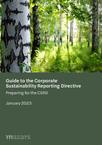
CSRD: Businesses can expect major changes
Here you will find an overview of our services and solutions for all aspects of the Corporate Sustainability Reporting Directive.
How can companies ensure that they are well prepared or on the right track to comply with the CSRD now that it has come into force? Our experts have summarized this for you in our CSRD Guide.
Does the CSRD apply to your company?
The CSRD replaces the currently applicable Non-Financial Reporting Directive (NFRD), which was implemented in Germany in 2017 with the CSR-RUG, and considerably expands the existing requirements for non-financial reporting. The following companies are affected:
- From 2025 (for the 2024 reporting year), all companies that are already required to report in accordance with the NFRD
- From 2026 (for the 2025 reporting year), all large companies that meet two of the following three criteria:
- more than 250 employees
- more than 20 million euros balance sheet total
- more than 40 million euros net turnover
- From 2027 (for the 2026 reporting year), all capital market-oriented small and medium-sized enterprises (SMEs) as well as small and non-complex credit institutions and company-owned insurance companies
- From 2029 (for reporting year 2028) non-EU companies with EU branches or EU subsidiaries
What are the CSRD requirements for your business?
The CSRD places high demands on the organisation and monitoring of CSR management and includes an obligation to conduct an external audit of sustainability information.
The requirements for sustainability reporting are becoming more stringent:
- Inclusion of sustainability-related aspects in business model & strategy
- Description of sustainability-related concepts in terms of significant impacts, risks and opportunities
- Adhere to the ESG concept (environmental financial indicators and taxonomy KPIs)
- Demonstrate that the economic activities conform to the taxonomy
- Include a description of the sustainability goals and their degree of achievement
- Take into account stakeholder interests
- Consider the value chain in due diligence processes
- Apply double materiality
From now on, sustainability information must always be included in the management report and not presented in a separate non-financial report.
The audit requirements are:
- Mandatory audit with limited assurance
- Process transparency and clear responsibilities
- Derivation of non-financial performance indicators
As part of the CSRD, EU reporting standards for companies are also being developed in parallel by the European Financial Reporting Advisory Group (EFRAG). The ESRS (European Sustainability Reporting Standards) will be mandatory for all companies that have to report in accordance with the CSRD and will specify the reportable information and the underlying reporting concepts. Find out more about this in our ESRS factsheet.
What does CSRD mean for your business?
Many companies are not yet sufficiently prepared for the expanded reporting requirements and have not yet implemented the necessary governance structures. Often, the necessary internal structures and processes, strategies, and goals, as well as staff resources are lacking.
If you are affected by this, you should therefore take steps to comply with the new requirements as these will bring about significant changes, not only strategically but also operationally, for your company. The expanded reporting requires a new organisational structure with transparent processes, operational controls, and clear responsibilities.
How Mazars can assist you:
Our experts help companies successfully implement the CSRD requirements, not only in establishing sustainability management and formulating the sustainability strategy but also with regard to sustainability reporting.









